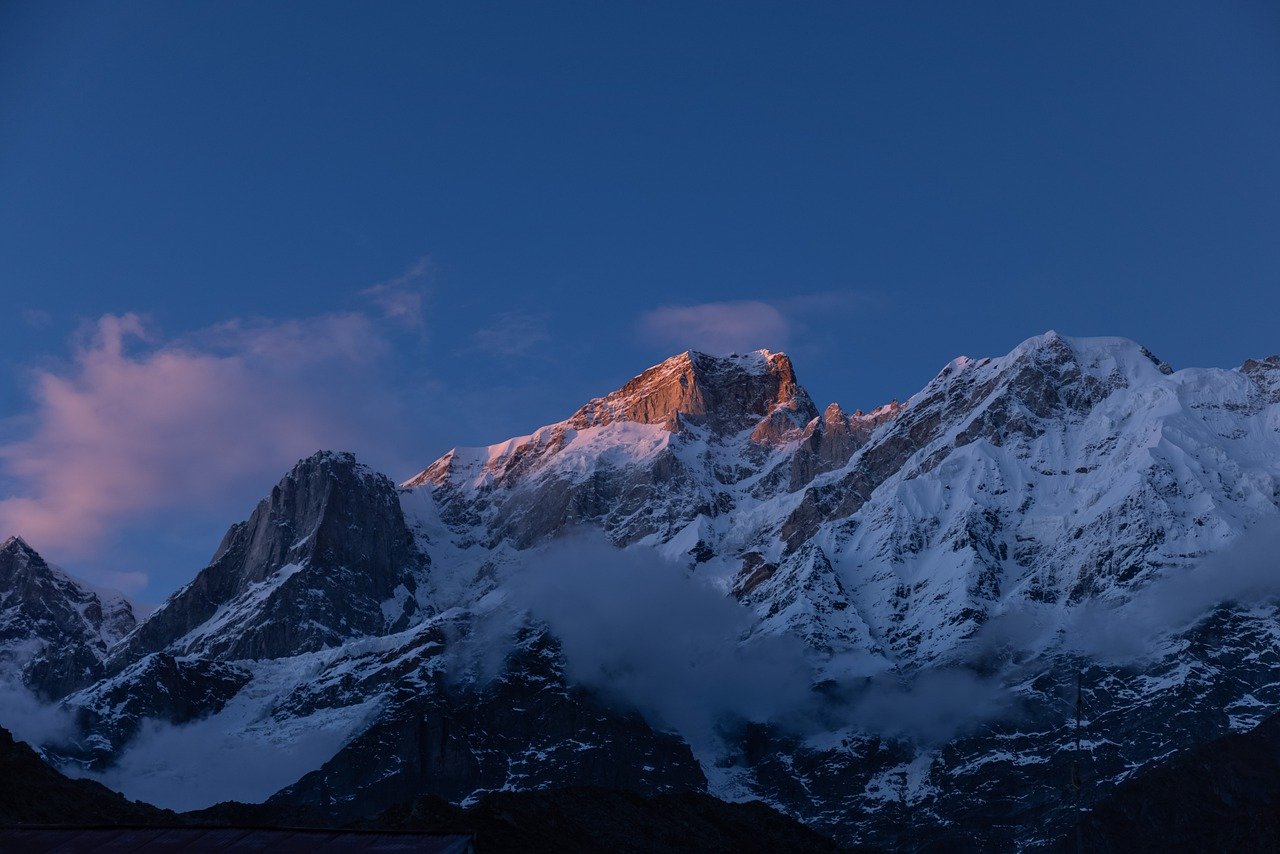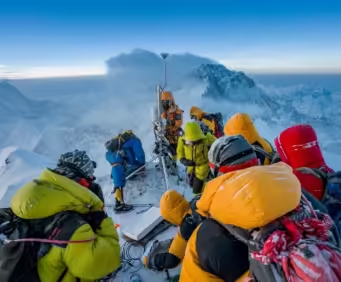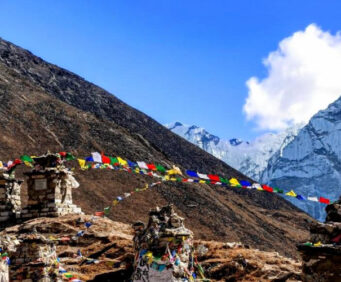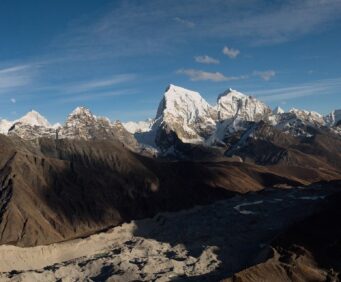
How to train for Everest Base Camp Trek
3rd March, 2024 - Posted By: Himalayan AbodeAside from being physically and psychologically ready for any adventure journey, training for the Everest Base Camp walk is equally crucial. Even while experienced hikers might think it’s simple, there’s one thing to consider. How physically fit do I need to be to hike to Everest Base Camp? In other words how to train for Everest Base Camp Trek. We must comprehend one thing before learning the fundamentals of the Everest Base Camp training program. The hike is not to be taken lightly, as it is around 81 miles (130 km) in length.
The Everest Trail is one of the most well-liked hikes in the world, as is well known. For those who are not very fit, it could be a little frightening. However, given the difficulty of Everest Base Camp and the necessary training, it is achievable for the majority of people. It is advised that hikers familiarize themselves with some fundamental guidelines for high-altitude trekking before to doing one.
How to travel there successfully
Training from Everest Base Camp is insufficient without a strong will to endure at least two weeks in the frigid highlands. Since this is a non-technical hike, no prior mountaineering expertise is necessary. However, it is important to remember the physical demands of Everest Base Camp. Indeed, it presents a significant barrier to individuals of all ages and physical abilities.
A successful hike can only be ensured by a high level of fitness, either before or following the Everest base camp training. In previous years, we have seen a wide range of individuals, including young and old, overweight and underweight, finish the amazing hike. Moreover, you need to properly train for Everest Base Camp
However, the altitude and the body’s adaptation to the oxygen shortage are crucial for success. For a pleasurable trip, we encourage training even though it is fairly doable to climb up to Everest base camp with a reasonable level of fitness. Knowing the whole packing list for the Everest base camp trek is extremely important because it’s essential to have a great trekking experience.
How much train is required for Everest Base Camp Trek
It is a good idea to be ready for difficult days because you will be walking five to seven hours a day, on average, 9.5 miles (15 km) each day. Every day won’t be the same; some could be simpler and involve no walking uphill at all. For a few days, starting with a 45-minute jog is an excellent idea.
Nonetheless, several months of consistent exercise will get you in shape, depending on your current level of fitness. Your level of fitness will gradually increase as a result of all the training. The foundation of your endurance training is determining your comfort zone and gradually raising it.
Physical Train And Fitness Required For Everest Base Camp Trek
It is imperative to plan for a basic training session if you want to keep healthy and strong while trekking in the mountains. Every person has a unique schedule in addition to unique physical and mental capabilities.
For this reason, being psychologically and physically prepared for the challenges of trekking in the Everest region is crucial. Numerous training courses, including cardiovascular and strength endurance, climbing, flexibility, and hiking-specific conditioning, are required for trekking to the base camp.
Being in excellent physical shape is one of the most crucial requirements for a successful high-altitude trek, such as the Everest Base Camp Trek. While technical mountaineering skills are not necessary, having any prior experience would be advantageous. The following fundamental elements are important to achieve a successful training program:
- Give yourself enough time to get ready.
- Select the appropriate acclimatization plan.
- Increase your level of fitness gradually; don’t jam everything in at once.
- Never skimp on a healthy diet while training cut back on workouts at least one week before leaving
- Get enough sleep the night before the hike.
You can examine the training portions and workout regimens that must be completed several months before to your Himalayan trekking adventure. See the detailed advice on physical exercise below, make use of the available resources, and adjust the timing of your training program accordingly:
Take small hikes as practice.
Nothing is worse than waking up on the first day of a hike with a blister on your toes. Your trekking adventure will be flawless if you practice short hikes since it will acclimate your body to walking lengthy distances. You’ll be able to break in your hiking boots and learn about the strain your knees will be under during the actual hike.
The one activity on your training plan that you can do even if you skip the others is hiking. You can safely complete your Everest climb if you do at least three to four short hikes lasting at least five to six hours each.
Conditioning of the Heart
Cardio training is an exercise that helps our bodies get ready to handle oxygen shortage for extended periods. Another name for it is an aerobic workout. This is the first kind of training that we advise all hikers to undertake since it essentially keeps you from running out of breath. We recommend stair-stepping, running, walking uphill and downhill, walking on a slanted treadmill, and aerobic classes as ways to do this.
We can also choose to do swimming, cycling, and bicycling as additional cardiovascular exercises. Gaining endurance when carrying weight packs during training sessions is also very beneficial. It will be simpler on the actual hike if you get used to the weights and progressively increase them when training on uphill treks.
Moreover, it is beneficial to engage in three to four training sessions of continuous activity, lasting 30 minutes each. It is also helpful to perform four to six one-hour aerobic sessions if you plan to trek to Everest Base Camp.
Increasing total strength is beneficial, particularly in the legs, upper back, lower back, and abdominal regions. Training with free weights, body weight, gym routines, or a backpack is also very fulfilling.
Strength Train for Everest Base Camp Trek
While it may not be as crucial as cardiovascular or aerobic training, strengthening your leg muscles will make the walk more enjoyable. Therefore, we advise following a training regimen that incorporates strength train with an Everest base camp Trek. You will need to have physical strength in every region of your body after walking for five to six hours while carrying a backpack.
When you combine aerobic activities with lift training, you can achieve it. It’s crucial to perform the exercises correctly because using the wrong form might be harmful. Without question, the most important body components for exercise are the legs. However, conditioning of the upper body is also necessary. This is because you will be transporting your belongings and equipment up to the base camp.
You must progressively refocus your training to increase your strength, stamina, and mental and physical energy. You must vary how much weight you utilize in each training phase. It’s also crucial that you take adequate breaks between each bout of exercise. Keeping the right form is also important.
Mental Conditioning
Although many climbers tend to overlook mental stamina, it is just as vital as other training. Some days on the EBC trek are comparatively tough, thus one needs to have the right attitude. Getting mentally trained, however, is not an easy task. Mental stamina is the only thing that you will have remaining when your body is physically exhausted during the long walks.
However, imagination plays a significant role in this. It helps to exercise as though you are already in the mountains and are imagining yourself on the base camp trip. During exercise, allowing your training partner to push you beyond your comfort zone can undoubtedly contribute to your mental toughness.
Running a full or half marathon is another excellent training objective that will support your mental toughness and physical fitness. You will undoubtedly be able to accomplish the EBC journey easily once you have finished this.
In the end, neither weight training nor cardiovascular conditioning will help you get ready. One can have a successful career with the appropriate mental and physical preparation, attitude, and willpower.
General Fitness for the Trek to Everest Base Camp
All things considered, the following is what you should know about general fitness preparation for the Everest Base Camp hike:
- Hiking while carrying a specific weight on your back constitutes back-to-back training.
- Climb for at least two to three hours at a minimum of 1,000 meters while wearing a backpack that weighs between 12 and 18 kg.
- For a week or two, progressively increase the weight each day.
- Work up progressively when training indoors while wearing a large pack and heavy boots or trekking shoes.
- For your gym workout, choose the step-mill equipment, which resembles a moving staircase.
- You will need to do extra gym workouts if you live in a place without any minor hills or mountains.
- During the training period, pay close attention to your body’s needs by scheduling at least one recuperation day each week.
- To allow yourself time to recover and emotionally and physically prepare, progressively lower the intensity of your exercise regimen during the last week of training.
- Before you embark on the hike itself, you will need to train for anywhere from three to five weeks.
Aside from the fundamental instruction and exercises, there aren’t many additional things you need to know. These will support you during the whole hiking experience to keep you healthy. It is also useful in comprehending the consequences of altitude sickness. The best ways to prevent altitude sickness are to hike at a slow and steady pace and to take regular breaks.
Advice to prevent altitude sickness while trekking to Everest Base Camp
- On each trekking day, make an effort to consume three to four liters of water.
- Avoid smoking and drinking alcohol while on the hike.
- Don’t disregard the requirement for you to take preventive medication when it’s vital.
- Hike in fewer steps as opposed to pushing much higher when ascending to greater altitudes.
- On days when you hike higher, always make sure you sleep at lower heights.
- Finally, choose a reputable trip organizer and/or guide who will help you in the event of an emergency while you are in the mountains.
Conclusion
One of the most popular treks in the world, the Everest base camp trip is doable for most individuals. All you need to survive at least two weeks of hiking at high altitudes is a healthy level of fitness and an extremely optimistic outlook. The only truly difficult aspect of the EBC journey is undoubtedly getting used to the altitude, which can be accomplished with a few weeks of training.
Our above-described training strategy can help make your climb to Everest base camp an amazing experience. That being said, the journey becomes more and more valuable as you get your cardiovascular system operating at peak efficiency.
FAQ
How fit does one need to be to trek in Nepal?
The altitude is the most difficult aspect of trekking in Nepal, however, it is something for which we can truly prepare well in advance of the walk. Prior hiking expertise is not required for a short walk such as the Annapurna Poon Hill Sunrise Walk.
If you intend to engage in lengthier trekking expeditions above 3,000 meters / 9,843 feet, such as the Everest Base Camp trek or the Annapurna Base Camp trek, you must be in good physical and mental health. You’re probably fit enough if you can walk 10–12 kilometers (6–8 mi) a day without any problems. Before the expedition begins, a pre-training course is necessary for inexperienced climbers.
We advise starting a regular workout regimen at least two months before your trip to Nepal to prepare yourself for the climb. You can start walking for a few hours each day, running, cycling, stretching, and toning activities. You can even start going up and down stairs.
How hard is the Everest base camp trek?
The trek to Everest Base Camp is a moderately strenuous one that doesn’t require any technical climbing knowledge. It’s a strenuous hike up to 5,364 meters/17,599 feet. As so, the length of the hike and the elevation increase over a variety of terrains are the only things that make it taxing. The difficult parts of trekking at high altitudes can be accomplished with at least three to four weeks of training.
How can I prevent altitude sickness during the Everest base camp trek?
There are a few things to keep in mind if you are planning to hike to Everest base camp without facing any troubles related to altitude sickness. Following the important tips to avoid altitude sickness during the EBC trek is very helpful. The first thing is to ascend slowly with proper rest and enough acclimatization. Secondly, you need to drink plenty of water and fluids and stay hydrated at all times. Eating sufficiently balanced food is one way to stay away from being hit by altitude sickness.
Next, you need to be headstrong and mentally prepared. The most important thing, however, is to train your body to cope with uphill hikes with plenty of aerobic exercises and gym workouts.
Is acclimatization necessary on the Everest base camp trek?
Acclimatization is the process of adjusting to new circumstances or a new climate. For the body to acclimate to the environment on this walk, it must rest at lower elevations. For all hikers and climbers, acclimatization is essential to avoiding altitude sickness. You never know; acute mountain sickness (AMS) can strike anyone, regardless of age, physical condition, or physical characteristics.
After I reach Everest base camp, will I become lighter?
You will be eating wholesome cuisine on this walk, whatever the teahouses conveniently have to offer. Trekkers frequently lose between 7 and 10% of their body weight, but some can make up for the loss by eating and sleeping healthily. We, at the base camp, encourage all climbers to eat as much as they can, and we supply a perfectly balanced meal for the duration of the expedition.
Recent Posts



